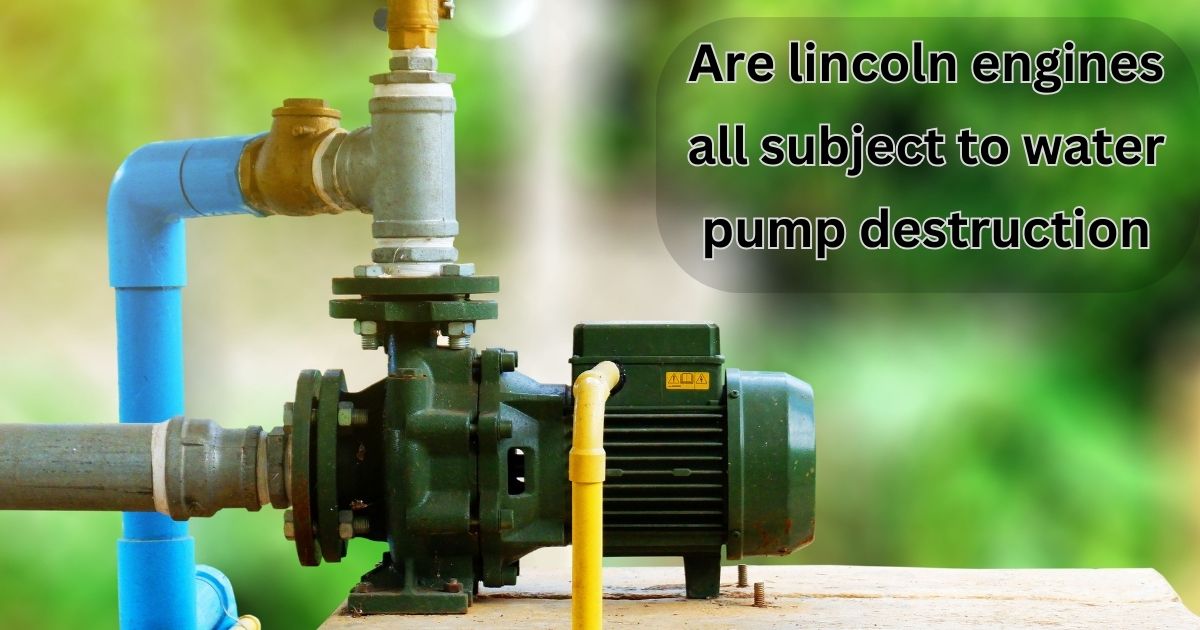When it comes to the reliability and longevity of Lincoln engines, one critical question often arises: “Are Lincoln engines all subject to water pump destruction?” This question is vital for current and prospective Lincoln vehicle owners who want to ensure their investment remains protected. The water pump plays a crucial role in maintaining the engine’s cooling system. Any issues with it can lead to significant engine problems. Understanding whether all Lincoln engines are prone to water pump failure can help you make informed decisions about maintenance and repairs.
What is a Water Pump?
A water pump is an essential component in your vehicle’s engine cooling system. It circulates coolant through the engine and radiator, maintaining an optimal operating temperature. Without a functioning water pump, the engine can overheat, causing severe damage or even complete engine failure. Vehicles use different types of water pumps, including centrifugal and rotary pumps, each designed to move coolant through the system efficiently.
The water pump is typically driven by the engine’s timing belt or chain. Its primary role is to ensure coolant reaches all necessary engine areas. This process regulates engine temperature and prevents overheating. Proper maintenance of the water pump is crucial for engine health, as any failure in this component can have cascading effects on performance.
The Role of the Water Pump in Lincoln Engines
In Lincoln engines, the water pump is crucial for maintaining engine temperature and performance. By circulating coolant through the engine and radiator, the water pump ensures the engine operates within the ideal temperature range. This helps prevent overheating and maintains optimal performance under various driving conditions.
Lincoln engines have specific cooling needs, and the water pump is designed to meet those requirements. To address the question, “Are Lincoln engines all subject to water pump destruction?”, it’s crucial to understand that the pump’s efficiency directly affects the engine’s ability to handle high temperatures. Regular maintenance and timely replacement of the water pump are essential for keeping your Lincoln engine running smoothly and mitigating potential issues related to water pump failure.
Common Issues with Lincoln Engine Water Pumps
Lincoln engine owners frequently report water pump issues. Common problems include leaks, bearing failures, and impeller damage. These issues can lead to reduced coolant circulation, overheating, and engine damage. Addressing these problems promptly is crucial to avoid more severe consequences.
A common issue is water pump leakage. This usually results from a worn-out seal or gasket. Bearing failures are another frequent problem, leading to unusual noises and reduced efficiency. While less common, impeller damage can also affect the water pump’s performance. Identifying and addressing these issues early can help prevent costly repairs and engine damage.
Factors Contributing to Water Pump Destruction
Several factors contribute to water pump destruction in Lincoln engines. Age and mileage play significant roles. As the engine ages, components like the water pump can wear out and become less efficient. Regular maintenance and timely replacement can help mitigate these issues.
Maintenance practices also significantly impact the lifespan of the water pump. Neglecting regular coolant changes, ignoring leaks, or failing to replace worn belts can lead to water pump failure. Additionally, the quality of replacement parts affects the water pump’s durability. Using high-quality OEM parts ensures better performance and longevity compared to cheaper alternatives.
Are All Lincoln Engines Affected?
Not all Lincoln engines are equally affected by water pump issues. The frequency and severity of water pump failures vary by engine model and design. Some Lincoln models may experience more frequent problems due to design flaws or manufacturing issues, while others may have fewer issues.
Historical data on water pump failures for different Lincoln models can provide insight into which engines are more prone to these issues. For example, some models may have had recalls or service bulletins addressing water pump problems. Researching your specific Lincoln model and its history helps you understand the likelihood of encountering water pump issues.
Case Studies: Lincoln Engines with Notable Water Pump Issues
Several Lincoln engines have notable water pump issues. For example, the Lincoln Navigator has experienced reports of water pump failures leading to overheating problems. Owners have found that timely replacement and regular maintenance can help mitigate these issues.
The Lincoln MKZ also has reports of premature water pump failure, leading to coolant leaks and engine overheating. Regular inspections and prompt repairs can prevent these issues from escalating.
The Lincoln Continental has had its share of water pump-related problems. Issues with the water pump in this model can lead to significant engine damage if not addressed promptly. Understanding the specific challenges associated with each Lincoln model helps you take proactive measures to protect your engine.
Signs of Water Pump Problems
Recognizing the signs of water pump problems early can help you avoid serious engine damage. Common symptoms include overheating, coolant leaks, and unusual noises from the engine. If you notice rising engine temperature or coolant puddles under your vehicle, these could be signs of a failing water pump.
Other indicators include whining or grinding noises from the engine, which may signal bearing failure. Additionally, decreased engine performance or increased temperature requires prompt attention to prevent further damage.
Also Read: Can Lifting Heavy Weight Above Shoulders Cause ETD
Preventive Measures and Maintenance Tips
Preventing water pump issues involves regular maintenance and proactive care. Regularly check the coolant level and condition, and replace the coolant as recommended by your vehicle’s manufacturer. Additionally, inspect the water pump and surrounding components for signs of wear or leaks.
Follow your vehicle’s maintenance schedule for timing belt or chain replacement, as these components drive the water pump. Using high-quality parts and fluids ensures the longevity of the water pump and prevents premature failure. Regular inspections by a qualified mechanic can catch potential issues before they become major problems.
How to Replace a Faulty Water Pump
Replacing a faulty water pump involves several steps to ensure proper installation and function. Start by draining the coolant and removing any belts or hoses connected to the pump. Then, unbolt the old pump and remove it from the engine.
After removing the old pump, clean the mounting surface and install the new pump, using a new gasket or sealant as required. Reattach the belts and hoses, refill the coolant, and check for leaks. Run the engine and monitor the temperature to ensure the new pump functions correctly.
Cost of Water Pump Replacement
The cost of replacing a water pump varies depending on the Lincoln engine model and the type of replacement parts used. On average, expect to pay between $300 and $800 for water pump replacement, including parts and labor.
OEM parts generally cost more than aftermarket options but offer better reliability and performance. Comparing prices and considering the long-term benefits of high-quality parts can help you make an informed decision. Additionally, some repair shops offer warranties on their work, providing added peace of mind.
Warranty and Coverage for Water Pump Issues
Lincoln vehicles often come with a manufacturer warranty covering certain repairs, including water pump issues. Review your vehicle’s warranty to understand what is covered and for how long. Extended warranties may also be available, offering additional coverage for water pump replacements and other repairs.
When seeking repairs, use authorized service centers to maintain warranty coverage. Some warranties have specific requirements for maintenance and repairs, so follow the guidelines to avoid voiding your warranty.
Impact of Water Pump Failures on Engine Longevity
Water pump failures significantly impact engine longevity. Overheating caused by a malfunctioning water pump can lead to severe engine damage, including warped cylinder heads, damaged gaskets, and engine failure.
Addressing water pump issues promptly prevents these severe consequences and extends engine life. Regular maintenance and timely repairs are crucial for protecting your engine and ensuring its continued performance.
Comparisons with Other Vehicle Brands
Comparing Lincoln engines to other vehicle brands helps understand how common water pump issues are across different manufacturers. Some brands may experience similar water pump problems, while others may have different reliability profiles.
Researching other vehicle owners’ experiences and comparing maintenance and repair records provides insight into how Lincoln engines stack up against competitors. This information helps you understand whether Lincoln’s water pump issues are unique or part of a broader trend in the automotive industry.
Expert Opinions and Automotive Reviews
Automotive experts and reviewers provide valuable insights into vehicle components, including water pumps. Reviewing expert opinions and owner feedback helps understand common issues with Lincoln engines and how to address them.
Expert reviews offer practical advice on maintaining your vehicle and preventing common problems. Additionally, hearing from other Lincoln owners provides real-world experiences and tips for managing water pump issues.
Future Developments and Innovations
The automotive industry continuously evolves, and future developments in water pump technology may address current issues in Lincoln engines. Innovations such as improved materials, advanced cooling systems, and more reliable components enhance water pump performance and durability.
Staying informed about industry trends and advancements helps you understand potential improvements in water pump technology. These developments may provide solutions to existing problems and offer better options for maintaining your Lincoln engine.
Conclusion
In summary, the question “Are Lincoln engines all subject to water pump destruction?” highlights an important issue for vehicle owners. While not all Lincoln engines are equally affected, water pump problems are a known concern for certain models. Understanding the role of the water pump, recognizing common issues, and following preventive maintenance practices can help you protect your engine and ensure its longevity.
By staying informed and proactive, you can minimize the risk of water pump failures and maintain the performance of your Lincoln engine. Regular maintenance, timely repairs, and quality parts are essential for keeping your vehicle running smoothly.










